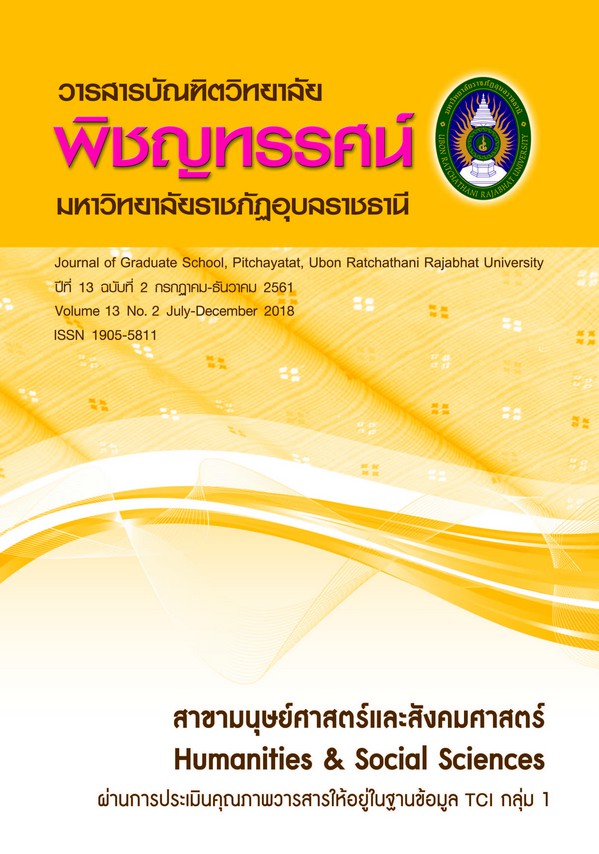การจัดประสบการณ์การเรียนรู้โดยใช้โครงงานเป็นฐานและการใช้ผังกราฟิกเพื่อพัฒนาทักษะการคิดสำหรับเด็กปฐมวัยในเขตภาคตะวันออก ภาคตะวันตก กรุงเทพมหานครและปริมณฑล
คำสำคัญ:
การเรียนรู้โดยใช้โครงงานเป็นฐาน, ผังกราฟิก, ปฐมวัยบทคัดย่อ
การวิจัยครั้งนี้มีวัตถุประสงค์เพื่อศึกษา 1) ผลการจัดประสบการณ์การเรียนรู้โดยใช้โครงงานเป็นฐานและการใช้ผังกราฟิกเพื่อพัฒนาทักษะการคิดสำหรับเด็กปฐมวัยในเขตภาคตะวันออก ภาคตะวันตก กรุงเทพมหานครและปริมณฑล 2) ความคิดเห็นของครูที่มีต่อการจัดประสบการณ์การเรียนรู้ของตนเองโดยใช้โครงงานเป็นฐานและการใช้ผังกราฟิกเพื่อพัฒนาการทักษะการคิดสำหรับเด็กปฐมวัย ในเขตภาตะวันออก ภาคตะวันตก กรุงเทพมหานครและปริมณฑล กลุ่มเป้าหมายประกอบด้วย 1) เด็กที่กำลังศึกษาอยู่ในระดับชั้นอนุบาลปีที่ 2 ปีการศึกษา 2559 โรงเรียนอนุบาลสังกัดสำนักงานคณะกรรมการส่งเสริมการศึกษาเอกชน จำนวน 344 คนจากโรงเรียน อนุบาล 12 แห่ง 2) ครูที่จัดประสบการณ์การเรียนรู้ให้เด็กอนุบาลระดับชั้นปีที่ 2 ปีการศึกษา 2559 โรงเรียนอนุบาลสังกัดสำนักงานคณะกรรมการส่งเสริมการศึกษาเอกชน จำนวน 12 คน เครื่องมือที่ใช้ในการวิจัยประกอบด้วย 1) แผนการอบรมเชิงปฎิบัติการสำหรับครูปฐมวัยซึ่งประกอบด้วยหัวข้อต่อไปนี้ การจัดประสบการณ์การเรียนรู้โดยใช้โครงงานเป็นฐานและการใช้ผังกราฟิกสำหรับเด็กปฐมวัย การตั้งคำถามเพื่อพัฒนาทักษะการคิดสำหรับเด็กปฐมวัย 2) แบบประเมินเชิงปฏิบัติการเพื่อประเมินทักษะการคิดสำหรับเด็กอายุ 4-5 ปี มีจำนวน 10 ข้อ 3) แบบสัมภาษณ์ความคิดเห็นของครูที่มีต่อการจัดประสบการณ์การเรียนรู้โดยใช้โครงงานเป็นฐานและการใช้ผังกราฟิก 4) แบบสังเกตการจัดประสบการณ์การเรียนรู้โดยใช้โครงงานเป็นฐานและการใช้ผังกราฟิกซึ่งบันทึกโดยผู้วิจัย วิเคราะห์ข้อมูลโดยใช้ ค่าเฉลี่ย ส่วนเบี่ยงเบนมาตรฐาน การวิเคราะห์เชิงเนื้อหา ผลการวิจัยพบว่า1) เด็กที่ได้รับการจัดประสบการณ์การเรียนรู้โดยใช้โครงงานเป็นฐานและการใช้ผังกราฟิกมีทักษะการคิดทุกด้านสูงกว่าก่อนการทดลอง 2) ครูทุกท่านมีความมั่นใจในการจัดประสบการณ์การเรียนรู้โดยใช้โครงงานเป็นฐานและการใช้ผังกราฟิกมากขึ้น สามารถตั้งคำถามปลายเปิดเพื่อพัฒนาทักษะการคิดได้หลากหลายมากขึ้น
เอกสารอ้างอิง
คณะกรรมการกิจการเพื่อการสื่อสารสังคม คณะกรรมการเครือข่ายพลังเยาวชนเพื่อการปฎิรูป. คู่มือฉบับพกพา การปฎิรูปการศึกษาไทย. กรุงเทพฯ: พริ้นท์ ซิตี้, 2554.
ทิศนา แขมมณี. ศาสตร์การสอน. กรุงเทพฯ: จุฬาลงกรณ์มหาวิทยาลัย, 2550.
มานพ สิงห์วี และ บัญญัติ ชำนาญกิจ. ผลการสอนโดยใช้เทคนิคผังกราฟิกประกอบรูปแบบการสอนแบบสืบเสาะหาความรู้ที่มีต่อผลสัมฤทธิ์ทางการเรียนวิชาฟิสิกส์และความคงทนในการเรียนรู้ของนักเรียนระดับชั้นมัธยมศึกษาปีที่ 4. วารสารวิชาการและวิจัยสังคมศาสตร์. 8, 23 (พฤษภาคม-สิงหาคม 2556): 115-128.
ภัทรภร ผลิตากุล. การจัดการเรียนรู้ตามแนวคิดโครงการเป็นฐานเพื่อประสบการณ์การสอนดนตรีของนักศึกษาคณะดุริยางคศาสตร์ มหาวิทยาลัยศิลปากร. Veridian E-Journal, Silpakorn University. 10, 2 (พฤษภาคม-สิงหาคม 2560): 1.
วิมวิภา วิบูลชาติ. ผลของการจัดกิจกรรมการใช้คำถามประกอบผังกราฟิกที่มีต่อการคิดวิเคราะห์ของเด็กปฐมวัย. วิทยานิพนธ์ศึกษาศาสตรมหาบัณฑิต มหาวิทยาลัยเกษตรศาสตร์, 2559.
ศึกษาธิการ, กระทรวง. การดูแลและการศึกษาเด็กปฐมวัย. (ออนไลน์) 2556 (อ้างเมื่อ 18 เมษายน 2561). http://www.onec.go.th/index.php/book/BookView/1233
สมบัติ เจริญเกษ และ บัญญัติ ชำนาญการ. ผลการจัดประสบการณ์แบบวิทยาศาสตร์ที่มีต่อความสามารถในการคิดวิเคราะห์ของเด็กปฐมวัย. วารสารวิชาการเครือข่ายบัณฑิตศึกษามหาวิทยาลัยราชภัฎภาคเหนือ. 4, 6 (มกราคม-มิถุนายน 2557): 117-128.
Beaumont, John. A Sequence of Critical Thinking Tasks. (Online) 2010 (Cited April 18, 2018). Available from: http://cms.education.gov.il/nr/rdonlyres/fb78f489-ebea-4771-b660-49cfb0e9029/121131/beaumont.pdf
International Baccalaureate Organization. IB Learner Profile. (Online) 2013 (Cited April 18, 2013). Available from: http://www.ibo.org/contentassets/fd82f70643ef4086b7d3f292cc214962/learner-profile-en.pdf
Katz, Lilian G., & Chard, Syllvia. Engaging Children’s Minds: The Project Approach (2nd Ed.). Norwood, NJ.: Ablex, 2000.
Ministry of Education. New Zealand Curriculum online: Key Competencies. (Online) 2014 (Cited April 17, 2018). Available from: http://nzcurriculum.tki.org.nz/Key-competencies
ดาวน์โหลด
เผยแพร่แล้ว
รูปแบบการอ้างอิง
ฉบับ
ประเภทบทความ
สัญญาอนุญาต
บทความทุกเรื่องได้รับการตรวจความถูกต้องทางวิชาการโดยผู้ทรงคุณวุฒิภายนอกอย่างน้อย 3 คน ความคิดเห็นในวารสารพิชญทรรศน์เป็นความคิดเห็นของผู้นิพนธ์มิใช่ความคิดเห็นของผู้จัดทำ จึงมิใช่ความรับผิดชอบของวารสารพิชญทรรศน์ และบทความในวารสารพิชญทรรศน์สงวนสิทธิ์ตามกฎหมายไทย การจะนำไปเผยแพร่ต้องได้รับอนุญาตเป็นลายลักษณ์อักษรจากกองบรรณาธิการ





